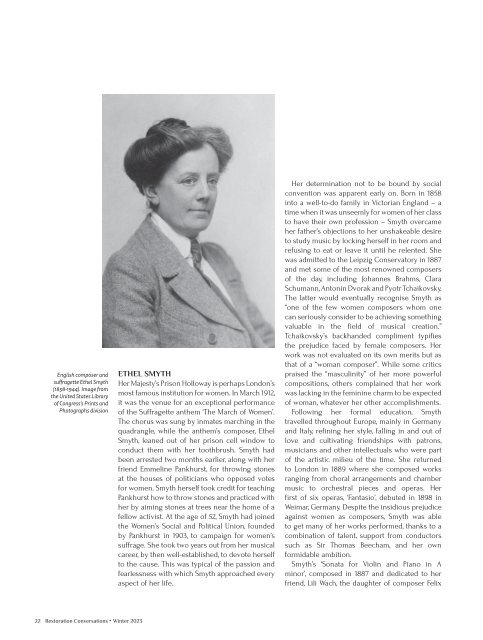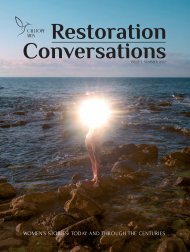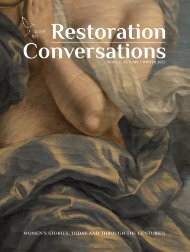Winter 2023
Restoration Conversations is a digital magazine spotlighting the achievements of women in history and today. We produce two issues a year: Spring/Summer and Fall/Winter
Restoration Conversations is a digital magazine spotlighting the achievements of women in history and today. We produce two issues a year: Spring/Summer and Fall/Winter
Create successful ePaper yourself
Turn your PDF publications into a flip-book with our unique Google optimized e-Paper software.
English composer and<br />
suffragette Ethel Smyth<br />
(1858-1944). Image from<br />
the United States Library<br />
of Congress’s Prints and<br />
Photographs division<br />
ETHEL SMYTH<br />
Her Majesty’s Prison Holloway is perhaps London’s<br />
most famous institution for women. In March 1912,<br />
it was the venue for an exceptional performance<br />
of the Suffragette anthem ‘The March of Women’.<br />
The chorus was sung by inmates marching in the<br />
quadrangle, while the anthem’s composer, Ethel<br />
Smyth, leaned out of her prison cell window to<br />
conduct them with her toothbrush. Smyth had<br />
been arrested two months earlier, along with her<br />
friend Emmeline Pankhurst, for throwing stones<br />
at the houses of politicians who opposed votes<br />
for women. Smyth herself took credit for teaching<br />
Pankhurst how to throw stones and practiced with<br />
her by aiming stones at trees near the home of a<br />
fellow activist. At the age of 52, Smyth had joined<br />
the Women’s Social and Political Union, founded<br />
by Pankhurst in 1903, to campaign for women’s<br />
suffrage. She took two years out from her musical<br />
career, by then well-established, to devote herself<br />
to the cause. This was typical of the passion and<br />
fearlessness with which Smyth approached every<br />
aspect of her life.<br />
Her determination not to be bound by social<br />
convention was apparent early on. Born in 1858<br />
into a well-to-do family in Victorian England – a<br />
time when it was unseemly for women of her class<br />
to have their own profession – Smyth overcame<br />
her father’s objections to her unshakeable desire<br />
to study music by locking herself in her room and<br />
refusing to eat or leave it until he relented. She<br />
was admitted to the Leipzig Conservatory in 1887<br />
and met some of the most renowned composers<br />
of the day, including Johannes Brahms, Clara<br />
Schumann, Antonin Dvorak and Pyotr Tchaikovsky.<br />
The latter would eventually recognise Smyth as<br />
“one of the few women composers whom one<br />
can seriously consider to be achieving something<br />
valuable in the field of musical creation.”<br />
Tchaikovsky’s backhanded compliment typifies<br />
the prejudice faced by female composers. Her<br />
work was not evaluated on its own merits but as<br />
that of a “woman composer”. While some critics<br />
praised the “masculinity” of her more powerful<br />
compositions, others complained that her work<br />
was lacking in the feminine charm to be expected<br />
of woman, whatever her other accomplishments.<br />
Following her formal education, Smyth<br />
travelled throughout Europe, mainly in Germany<br />
and Italy, refining her style, falling in and out of<br />
love and cultivating friendships with patrons,<br />
musicians and other intellectuals who were part<br />
of the artistic milieu of the time. She returned<br />
to London in 1889 where she composed works<br />
ranging from choral arrangements and chamber<br />
music to orchestral pieces and operas. Her<br />
first of six operas, ‘Fantasio’, debuted in 1898 in<br />
Weimar, Germany. Despite the insidious prejudice<br />
against women as composers, Smyth was able<br />
to get many of her works performed, thanks to a<br />
combination of talent, support from conductors<br />
such as Sir Thomas Beecham, and her own<br />
formidable ambition.<br />
Smyth’s ‘Sonata for Violin and Piano in A<br />
minor’, composed in 1887 and dedicated to her<br />
friend, Lili Wach, the daughter of composer Felix<br />
22 Restoration Conversations • <strong>Winter</strong> <strong>2023</strong>





